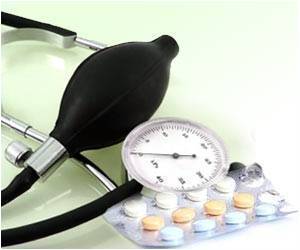A study published in Pediatrics, suggests that children who have a first elevated blood pressure at the doctor's office are not likely to receive the recommended follow-up blood pressure readings within a month.

Authors of the study examined the electronic health records of 72,625 children and adolescents ages 3 to 17 over a three-year period at Kaiser Permanente in Colorado and Northern California, and HealthPartners of Minnesota who received blood pressure checks as part of their routine clinical care. While 8.4 percent of children in the study had at least one visit with elevated blood pressure, only 20.9 percent of those children received another blood pressure screening within a month. Of those with one elevated blood pressure reading, only 1.4 percent went on to develop childhood hypertension, defined as three consecutive high blood pressure readings on three separate days.
"Diagnosing hypertension during childhood is difficult because normal blood pressure for children changes as they age. It's fairly common for children to have a single elevated blood pressure reading, but when their doctors repeat the test, it appears that most children won't actually have hypertension," said Matthew F. Daley, MD, a researcher at the Institute for Health Research, Kaiser Permanente Colorado. "This tells us that parents should have their children's blood pressure checked and, if it's high, rechecked at the same visit."
The researchers also found that factors such as obesity (which is associated with hypertension) or stage 2 hypertension did not significantly affect whether children received follow-up blood pressure checks within a month of a first elevated blood pressure.
Hypertension is a chronic medical condition characterized by elevated blood pressure in the circulatory system, which forces the heart to work harder than normal to circulate blood throughout the body. Children's blood pressure can be quite variable, and excitement and nervousness at the doctor's office can result in elevated blood pressure readings for children, according to the authors, so children and adolescents are only diagnosed as hypertensive after three consecutive readings that are at or above the 95th percentile for their age, sex and height.
Screening for hypertension in children and adolescents who don't exhibit symptoms occurs during routine clinical care, but little is known about patterns of care after a first elevated blood pressure. Guidelines from the National Heart, Lung and Blood Institute recommend repeating the blood pressure one to two weeks after the first elevated blood pressure.
Advertisement
Kaiser Permanente can conduct transformational health research like this in part because it has the largest private patient-centered electronic health record system in the world. The organization's electronic health record system, Kaiser Permanente HealthConnect®, securely connects 9.1 million patients to 17,000 physicians in 611 medical offices and 37 hospitals. It also connects Kaiser Permanente's research scientists to one of the most extensive collections of longitudinal medical data available, facilitating studies and important medical discoveries that shape the future of health care delivery for patients and the medical community.
Advertisement
Source-Eurekalert















